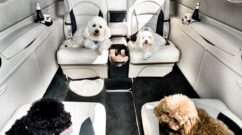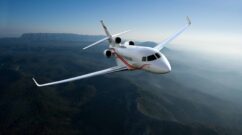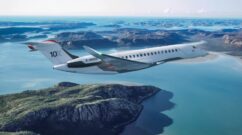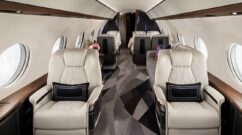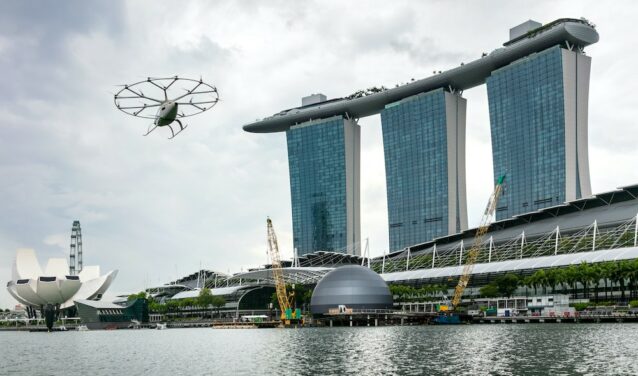In a context where the ecological transition is at the heart of the debate, some start-ups are developing innovative projects such as the German start-up specializing in urban air mobility, Volocopter, which has developed a flying cab, the Volocity. The latter has received a flight certificate from the European Union Aviation Safety Agency (EASA) for drone mode (without passenger) and in non-risky areas. Less polluting because it is electrically propelled and more flexible because it circulates in the air, the Volocity represents an alternative to the air pollution caused by massive vehicle traffic, particularly in large cities.
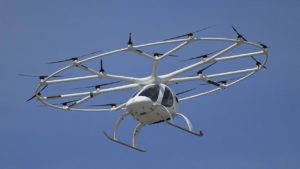
Volocopter is the first start-up with an eVTOL project, an electric vertical take-off and landing cab, to obtain a Design Organisations Approval (DOA) from the EASA, allowing it to continue the development of its flying cab with a large autonomy. “The Design Organisation Approval is a crucial step towards obtaining commercial certification and brings air cabs ever closer” says Florian Reuter, CEO of Volocopter.

The German company was subsequently granted a flight license by EASA, the EU’s aviation safety authority, on June 24, 2021, confirming its lead over its competitors.
Volocity has the capacity to transport two adults and their luggage over a distance of 35 km and at a maximum speed of 110 km/h. Volocopter’s ambition is to replace the helicopter as a means of express transportation in densely populated urban areas, but above all it wants to explode the growth of this sector. Volocopter’s flying cab is based on technology derived from drones: 9 batteries and 18 electric motors, each with a propeller. A predominant advantage of the Volocity is that it is 5 times quieter than a helicopter.
Volocopter’s objectives for 2023
To date, this EASA approval allows Volocity to operate in clearly defined low-risk areas. Until now, Volocopter’s drone, the Volocity, has only made inaugural flights, as tests in Helsinki, Singapore and Dubai.
The EASA accreditation underlines the viability of Volocopter’s processes, allowing the company to enjoy a sufficiently high level of safety regarding its manufacture and its daily use.

Another cargo version of the 2X flying cab intended for the transport of goods is currently being designed. Regarding the Volocity, Volocopter hopes for a commercialization as early as 2023, especially since 70 companies in the world are each developing their prototype flying cab on the same type, such as Airbus, which had presented in June 2019 its second prototype of autonomous flying cab Alpha One: the Alpha Two, a device characterized by many innovations and technical improvements such as the absence of a cockpit.
The German start-up Volocopter has announced the opening of reservations for the first commercial flights of its first flying cab, the Volocity. In total, 1000 tickets are available and more than 550 tickets have already been booked in 2 days. As for the price, the only known indication is that a fifteen-minute flight would correspond to 300 euros per passenger.
It takes no more than fifteen minutes by VTOL to make a trip between Roissy and La Défense, whereas by car, it takes at least forty minutes.
Volocopter’s objective is to make the project a reality by 2023 in order to allow visitors and inhabitants of Paris to travel between Paris and the Olympic sites for the 2024 Olympic Games.
In order to accelerate the realization of this project for the 2024 Olympic Games, the Ile-de-France region, the RATP and the Paris airports agreed on September 30 to a joint agreement on urban air mobility, allowing the establishment of a test area at the Pontoise airfield and promoting the environmental transition of air transport.
“The structuring of an air mobility sector around the Pontoise-Cormeilles-en-Vexin airfield is in line with the dynamics of the regional recovery plan, the conclusions of the COP and the 2024 Olympic and Paralympic Games. This event is an exceptional opportunity to mobilize the aeronautical industry, to promote the Paris Region as a reference region in the global market for urban air mobility,” said Valérie Pécresse, President of the Paris Region.
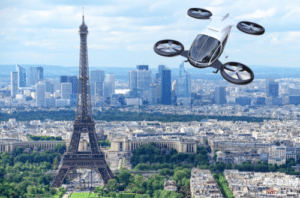
The future of air mobility in major cities
Today, the EASA certification does not allow the start-up to begin commercial flights, but it represents a key step in anticipation of the first commercial flights planned for the Paris Olympics in 2024. Indeed, the Olympics are no longer positioned solely as a sporting competition but also as a geopolitical message, a demonstration of strength and power for the country that organizes it as part of the sports soft power. The 2024 Olympics in Paris represent an opportunity for France to shine internationally.
The project to develop urban air mobility strengthens the attractiveness of the Ile-De-France region on an international scale, through the collaboration of various public and private players, including Helifirst, a helicopter airline specializing in business aviation, and Helipass, a digital platform for booking helicopter flights in the management of operations for example. For the moment, in the “vehicles” branch, three companies have been selected to fly their flying cabs for the 2024 Olympics in Paris: Volocopter, Airbus and Ehang, a Chinese startup.
A complementarity of services between the Volocopter and business aviation?
The private jet rental is an indispensable tool that answers the problem of time. Customers who use private jet rental are looking for flexibility, security and speed. Connections between airports and city centers are often complicated and long due to heavy traffic. Flying cabs could in the near future help avoid traffic jams by connecting the FBO to the destination. “They will serve a number of points of interest between Orly airport and Charles de Gaulle Etoile, as well as the center of Paris, possibly at the Issy-les-Moulineaux heliport,” says Marie-Claude Dupuis, director of innovation and development strategy at RATP.
These electric vehicles would solve the problem of excessive traffic in major cities while respecting the environment. They would thus represent an ideal complement to the rental of private jets.
However, these flying cabs have various weaknesses, such as a very limited autonomy, a low speed (110km/h maximum) and a low carrying capacity. However, despite these various shortcomings, the number of start-ups working on the air cab market is multiplying, especially in China. According to a study conducted by the consulting firm Oliver Wyman in 2019, flying cabs would represent a potential market of 35 billion dollars in 2035. Indeed, by 2035, more than 50,000 flying cabs could be operating in nearly 90 cities around the world.
This market has a significant potential, in the near future, it could provide a solution to the problem of traffic congestion, “in the future, we think that eVTOLs will pick up customers at their home” says Florian Reuter, CEO of Volocopter.
The ADP Group represents a considerable support for the Volocopter flying cab project. Paris Le Bourget airport is today the leading airport for business aviation. It is the only ADP Group entity to have sites adapted to different categories of aircraft.
- 2 airfields for business aviation, Toussus-Le-Noble and Pontoise-Cormeilles-en-Vexin
- 8 commercial airfields: Chavenay, Chelles, Coulommiers, Etampes, Lognes, Meaux, Persan and Saint-Cyr
- 1 heliport at Issy-Les-Moulineaux
Can we imagine 100% air and electric transportation for tomorrow?
These flying cabs could welcome customers with limited time to drop them off at their home or another location from the various sites of the Aéroports de Paris group, including the Paris Le Bourget airport, the Issy-Les-Moulineaux heliport or the Pontoise airfield, which is currently the test area for flying cabs

The German start-up Volocopter has also unveiled a new vertiport prototype in Singapore to host the Volocity, called VoloPort. This terminal will be modular and can therefore easily adapt to different urban locations: building roofs, train stations or parking lots.


Our air experts are at your disposal 24/7 for your private flight at +33 (0) 1 44 09 91 82. Do not hesitate to visit our online quote to get a price estimate for your private flight.
